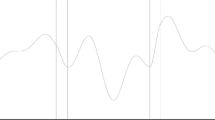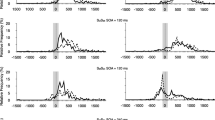Summary
The goal-setting approach to task motivation is applied to examine the way in which subjects control their performance on two concurrently performed tasks under the guidance of different goals in a dual-task situation. The tasks were a simple auditory-manual reaction time (RT) task and a visual-manual pursuit-tracking task. The goal conditions assigned alternatively to the tasks differed with respect to goal specificity and feedback information (KR) given after the trials. It is shown that the improvement of performance in the task with hard, specific goals is achieved in both cases at the cost of the concurrently performed other task which, on the basis of a lack of feedback and a rather unspecific goal instruction, should have a lower priority. The data reveal some strategies hidden behind these overall changes of the average performance at both tasks. For the RT task, the adjustment to the different goals is mainly achieved by changes in the temporal control or preparatory processes as can be inferred from the RT distributions as well as from the analysis of some typical errors. For the tracking task, changes in the tracking accuracy within the overlapping RT intervals are the best indicators for the performance control under the different goal conditions.
Similar content being viewed by others
References
Ach, N. (1910). Über den Willensakt und das Temperament. Leipzig: Quelle und Meyer.
Ach, N. (1935) Analyse des Willens. In: E. Abderhalden (Hg.), Handbuch der biologischen Arbeitsmethoden Bd. VI, Berlin: Urban und Schwarzenberg.
Atkinson, J.W. (1964). An Introduction to Motivation. Princeton, N.J.: Van Nostrand.
Bavelas, J.B. & Lee, E.S. (1978). Effects of goal level on performance: A trade-off of quantity and quality. Canadian Journal of Psychology, 32 219–240.
Campion, M.A. & Lord, R.G. (1982) A control systems conceptualization of the goal-setting and changing process. Organizational Behavior and Human Performance 30 265–287.
Erez, M. (1977). Feedback: A necessary condition for the goal setting-performance relationship. Journal of Applied Psychology, 62 624–627.
Griew, S. (1959). Set to respond and the effects of interrupting signals upon tracking performance. Journal of Experimental Psychology, 57 333–337.
Heckhausen, H. (1977). Achievement motivation and its constructs: A cognitive model. Motivation and Emotion, 1 283–329.
Heckhausen, H. (1980). Motivation und Handeln. Berlin: Springer.
Israel, J.B., Chesney, G.L., Wickens, C.D. & Donchin, E. (1980). P 300 and tracking difficulty: Evidence for multiple resources in dual-task performance. Psychophysiology, 17 259–273.
Kahneman, D. (1973). Attention and Effort. Englewood Cliffs, N.J.: Prentice Hall.
Kuhl, J. (1984). Volitional aspects of achievement motivation and learned helplessness. Toward a comprehensive theory of action control. In: B.A. Maher (Ed.), Progress in Experimental Personality Research (Vol. 13), New York: Academic Press.
Locke, E.A. (1968). Toward a theory of task motivation and incentives. Organizational Behavior and Human Performance, 3 157–189.
Locke, E.A. & Bryan, J.F. (1966). Cognitive aspects of psychomotor performance: The effects of performance goals on level of performance. Journal of Applied Psychology, 50 286–291.
Locke, E.A. & Bryan, J.F. (1969). The directing function of goals in task performance. Organizational Behavior and Human Performance, 4 35–42.
Locke, E.A., Shaw, K.N., Saari, L.M. & Latham, G.P. (1981). Goal setting and task performance: 1969–1980. Psychological Bulletin, 90 125–152.
McLeod, P. (1977). A dual task response modality effect: Support for multiprocessor models of attention. Quarterly Journal of Experimental Psychology, 29 651–667.
Navon, D. & Gopher, D. (1979). On the economy of the human-processing system. Psychological Review, 86 214–255.
Niemi, P. & Näätänen, R. (1981). Foreperiod and simple reaction time. Psychological Bulletin, 89 133–162.
Norman, D.A. & Bobrow, D.G. (1975). On data-limited and resource-limited processes. Cognitive Psychology, 7 44–64.
Norman, D.A. & Bobrow, D.G. (1976). On the analysis of performance operating characteristics. Psychological Review, 83 508–510.
Ogden, G.D., Levine, J.M. & Eisner, E.J. (1979). Measurement of workload by secondary tasks. Human Factors, 21 529–548.
Powers, W.T. (1978). Quantitative analysis of purposive systems: Some spadework at the foundations of scientific psychology. Psychological Review, 85 417–435.
Rabbitt, P.M. (1981). Sequential reactions. In: D.H. Holding (Ed.), Human Skills New York: Wiley & Sons, p. 153–175.
Terborg, J.R. (1976). The motivational components of goal setting. Journal of Applied Psychology, 61 613–621.
Vroom, V.H. (1964). Work and Motivation. New York: Wiley.
Wickens, C.D. (1976). The effects of divided attention on information processing in manual tracking. Journal of Experimental Psychology: Human Perception and Performance, 2 1–13.
Wickens, C.D. (1980). The structure of attentional resources. In: R.S. Nickerson (Ed.), Attention and Performance VIII. Hillsdale N.J.: Lawrence Erlbaum, p. 239–257.
Wickens, C.D. & Gopher, D. (1977). Control theory measures of tracking as indices of attention allocation strategies. Human Factors, 19 339–365.
Author information
Authors and Affiliations
Additional information
This research was supported by a grant from the Deutsche Forschungsgemeinschaft (Kl 408/4-2)
Rights and permissions
About this article
Cite this article
Schmidt, KH., Kleinbeck, U. & Brockmann, W. Motivational control of motor performance by goal setting in a dual-task situation. Psychol. Res 46, 129–141 (1984). https://doi.org/10.1007/BF00308598
Issue Date:
DOI: https://doi.org/10.1007/BF00308598




